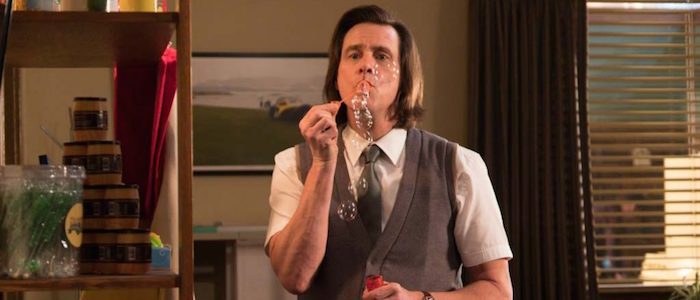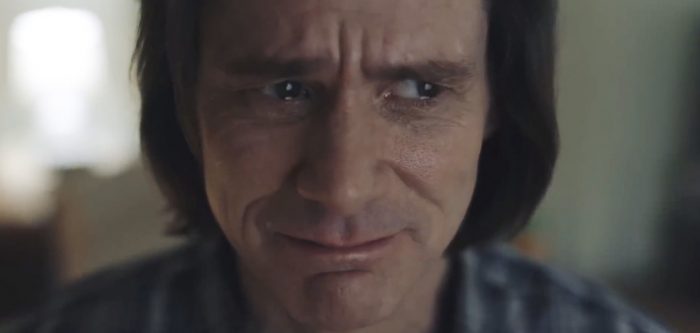
Showtime’s new dramedy Kidding stars Jim Carrey in a dramatic role. He plays children’s television host Jeff Pickles, star of Mr. Pickles’ Puppet Time, who sings songs to teach kids about life lessons, but inside he’s dealing with real pain. His son died in an automobile accident a year before, and he’s now estranged from his wife (Judy Greer) and surviving son.
Eternal Sunshine of the Spotless Mind filmmaker Michel Gondry directed the pilot (which is available to watch for free online right now) and five more episodes of Kidding. Gondry spoke with /Film before the Kidding panel at the Television Critics Association. Kidding premiered last night and airs Sunday nights on Showtime.
Mr. Pickles wants to talk about death and his producer is resistant to it. Mr. Rogers talked about death and assassination in the ’60s. Do you think the television industry of today would not be open to characters like him introducing these adult concepts to children?
Wasn’t it Sesame Street where one of the cast died and they did a show to explain to the kids that he was gone? Most other shows would make up a story, he’s gone to Florida or something. I think in America, it seems to me that kids are overly protected which is good on a certain level, of course violence and physical abuse. But I don’t think they would talk about death in a TV show for kids these days.
Is it only the last 10 years or so that has become to over protected?
Yeah, but I don’t know how it was before.
And I don’t think Sebastian is trying to protect the children. He only cares about money, right?
I would say 80% he cares for money and 20% it’s more global. He sees his son going the wrong direction. That’s the first step. He has the sense that Jeff is going down and he wants to resist it.
In addition to producing Kidding, did you have to produce a legitimately good Mr. Pickles show?
Yes. I tried to really do something genuine that would work on its own and create a universe itself, not just little windows on something we imagine being bigger. I think we had to create the full world.
Did you imagine Mr. Pickles in half hour episodes even though we only see pieces of it?
Yes, in a way. At some point with Dave Holstein we said, “We should do a compilation of the parts which are the kids’ show and do a special so a kid can watch it.” Not always, but sometimes we imagined how the whole show could go.
Did you hire real puppeteers who can act outside of the Mr. Pickles parts?
Yes. All the puppets were manipulated and operated by puppeteers that specialize in that, and really the casting for the voice and the character.
Who wrote the music for Mr. Pickles?
Alan Schmuckler. I think he’s a schoolmate of Dave Holstein. They always wanted to do a musical. He’s incredibly talented. I saw him record the demo for Jim, the voice for Jim. He was extremely reactive and could change harmonies really, really fast.
Will there be enough music to release a soundtrack?
Yes, sure. Not necessarily. Until now, we didn’t really use existing music but there is all the songs and there is the score.
Is the apartment he lives in built at odd angles or is that the way you film it?
It’s built normally but there is so much empty space, just by putting the camera close to the ground you feel it’s distorted.
Did you design the locations to be a little bit surreal too?
No, but I didn’t do research. I did it the way I would do it for me or for my daughter. It just came naturally. It’s a universe I like to travel into. My production designer knows me very well, Max Orgell. He knew what I like a lot.

Did Jim shave a wig or his actual hair?
Haha, that’s for you to find out.
What do you tell the little girl she’s reacting to? Because obviously she doesn’t know when the reverse angle is a hand job.
She was pretty solid. When Catherine is screaming at her, she just talked to her. I let Catherine direct her. She talked to her so she knew it was acting. As for what she sees through the window, we didn’t tell her anything. “They were just shaking hands.”
Did you and Jim pick up right where you left off on Eternal Sunshine of the Spotless Mind?
I think over the years our relationship in a weird way evolved. Partially because the importance of Eternal Sunshine grew over those 10-15 years. We realized we had done something special and we were really eager to work together again. It was immediate. As for Eternal Sunshine, I had to prove myself to him because Charlie Kaufman was the real official talent. But at the end of Eternal Sunshine he understood that I gave him decent direction. Over the years he probably has been complimented on his performance which was deserved. So when we started Kidding, we were really on the same wavelength. It was very easy to work together because he has no ego. You would not expect that from him but he has no ego. If I tell her the most basic direction, he’s going to follow it and try it. It’s very difficult to tell an actor that he’s overacted, because it’s embarrassing to hear. Jim, I say, “Come on, Jim. You overacted. Tone it down.” He says, “Okay, okay, sorry, sorry, I’ll do it.” Every direction he takes like that. Sometimes I don’t find this as easy with other actors because I know I have to find the right language. Our language with Jim is very quick and imaginative. It doesn’t have to have a pretense of being psychological.
You’ve been able to work with studios and do franchise movies as well as your own independent movies. What was the process with Showtime of working out what Kidding is going to be and what they wanted it to be?
The idea has been cooking in Dave Holstein for years, the concept and the story and even the dialogue. They wanted to find a team that could bring it to life in terms of creativity and probably moneywise. So they thought Jim and I together could take Dave’s story and make it exist.
Were there any things you had to fight for on Kidding?
Oh yes. Many things. When you do a movie, people have different interests. The hierarchy is very different from television to filmmaking. Sometimes I had to fight to get my creativity through because it wasn’t fitting the vision of the writer. And it’s normal, I guess, in television. I was not used to that so I was sometimes resistant. You don’t have, like in movies, a producer who’s going to make the decision, who holds the film all together.
Isn’t that the showrunner?
Well, but the showrunner is an artist as well. He’s a creator. He’s a creative person. The show runner to me is the writer. I’m creative as well so we may disagree. I had a hard time to accept that it was the showrunner who made the decision, who had the role of the producer. When I did Eternal Sunshine with Charlie Kaufman, we had disagreements sometimes but we would work as a team. I was not told by him what it should be and there was a producer anyway to help with the process.
Can you give us one example that you were able to convince Holstein to do your way?
It’s hard to give you a precise example. It’s also in the tone, the acting. It’s everything, every detail. Most of the time we agreed and the best is when we talked before. When it’s during shooting, if you come to talk to me, it’s very disorienting but I survived it. It was fine.
The post ‘Kidding’ Director Michel Gondry on Moving to Television and Telling Jim Carrey When He’s Overacting [Interview] appeared first on /Film.
from /Film https://ift.tt/2Nvy8Vd

0 Comments